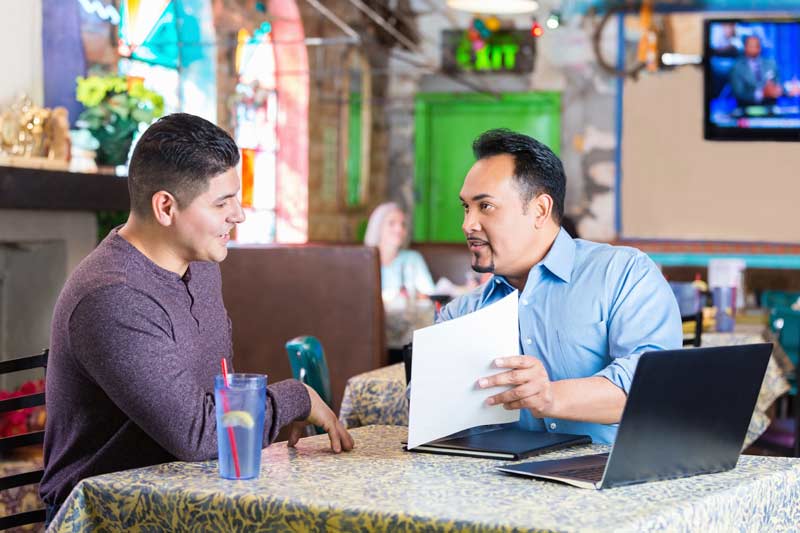
One kind of job interview is not about landing you a position; it's about advancing your career and finding new collaborators.
The informational interview, or informal conversation, is the lynchpin of your strategy for job searching, exploring careers, and networking. Without informational interviews, it's difficult to learn about career paths and entry points, hiring trends and issues, decision-makers and field-leaders, and industry innovations.
An informational interview is simply a professional conversation with another party. Most people in the business world know the term and the concept behind it. But scientists and engineers might not be aware of this critical tool in your networking and career exploration toolbox.
The goal of an informational interview is to
- open lines of communication …
- in order to exchange information and …
- elucidate each person's promise of value …
- which can lead to crafting a win-win partnership …
- to solve each other's problems.
Unlike a job interview, in which an organization with an open position assesses whether a given candidate can solve their specific problems, an informational interview is a mutual exchange of information; you contribute just as much as the organizational representative.
Every time you initiate professional contact, you should ask for an informational interview or informal conversation. Most people receiving this request will respond positively, because the phrase is a code word marking you as someone neither desperate for a job nor seeking something for nothing. Instead, it suggests that you want a mutually beneficial conversation, that can lead to an alliance.
I recall a conversation with a woman I met on an airplane. As I sat down I noticed that her gorgeous high-heeled shoes matched her handbag precisely. I nearly freaked out. I complimented her style and elegance, and that set in motion a two-hour discussion that extended from Dallas to Washington, DC.
I learned that she was the wife of a prominent US senator, and she asked what I did. When I told her that I was a professional speaker and corporate comedian, her eyes lit up. She said that she regularly gives speeches at charity gatherings and struggles enliven them with humor. "Do you have any tips?" she inquired. Because comedy is my business and passion, I was thrilled to offer some ideas to infuse her next speech with apposite and professional wit.
What we had was an informational interview. We talked about her work, her needs, and her goals and I talked about how my work could solve her problems. Because I genuinely wanted to learn more about what she does, I was able to spontaneously create an opportunity for myself to contribute to her success—in this case, helping with her speeches. This is just one example of the many times an informational interview has either revealed a hidden career opportunity or enabled me to create one on the spot.
Although professionals in many industries regularly employ the phrase "informational interview," not all do. Academia is a notable example: If you were to ask a professor for an "informational interview," she or he may be confused. For this reason, I generally prefer asking for an "informal conversation." In either case, the goal is to demonstrate that you are digging for knowledge, not a job. Here's one way to approach an academic:
Dear Professor Day,
My name is Alaina Levine and I am a biophysics graduate student at the University of X. I enjoyed your recent article in Physics Today about active-matrix medical imagers and wondered if they could be converted from clinic use with patients to laboratory use with mice.
I am very interested in this topic, as my dissertation focuses on understanding and treating osteoporosis. I would like to learn more about your projects. Perhaps there is an opportunity for use to collaborate on a paper or a grant proposal. From my own research and experience, I know that there is a need for more sensitive x-ray imagers in biomedical labs.
I would also be interested in learning how you came to this field and hearing your advice as to how I might convert ideas into commercial products. Would it be possible to make a short phone or Skype appointment to chat? Please let me know when you would be available in the next few weeks. I am based in Tucson, Arizona and am on Pacific Time.
Please note I would be happy to send you my Curriculum Vita for you to review before our meeting. Alternatively, I invite you to look at my Linkedin profile at www.linkedin.com/in/AlainaGLevine to see more about my work and interests.
Thank you very much and I look forward to hearing from you,
Alaina
If you are currently unemployed, you may feel like you want to use an informational interview to get a job, or at least an interview, or to reach decision-makers in the organization. You may even feel desperate. It is unwise to demonstrate your state to your contact. An unsolicited request for an "informational interview" or "informal conversation" is far more likely to elicit a positive response than a frantic plea for a job. Using the "informational interview" phrase sets the tone of your conversation and your needs: You want to learn more about what they do, and together explore ways in which you can add value.
In my next column, part 2, I will discuss what to say during an informational interview. Stay tuned!
Related Links: Informational interviews II: What do you talk about?
Alaina G. Levine is a science and engineering writer, career consultant, and professional speaker and comedian. Parts of this column appear in Networking for Nerds (Wiley), Levine's newly published book on networking strategies for scientists and engineers. She can be reached through her website, www.alainalevine.com or on Twitter at @AlainaGLevine.
